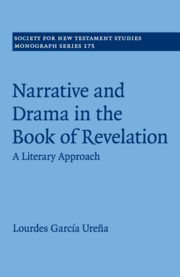Book contents
- Narrative and Drama in the Book of Revelation
- Society for New Testament Studies:
- Narrative and Drama in the Book of Revelation
- Copyright page
- Dedication
- Contents
- Tables
- Preface
- Abbreviations
- Introduction
- 1 The Literary Forms of the Book of Revelation
- 2 John, Eyewitness and Herald of the Visions
- 3 John, Auditory Witness and Herald of the Word
- Epilogue
- Bibliography
- Index of Ancient Sources
- Subject Index
Introduction
Published online by Cambridge University Press: 15 August 2019
- Narrative and Drama in the Book of Revelation
- Society for New Testament Studies:
- Narrative and Drama in the Book of Revelation
- Copyright page
- Dedication
- Contents
- Tables
- Preface
- Abbreviations
- Introduction
- 1 The Literary Forms of the Book of Revelation
- 2 John, Eyewitness and Herald of the Visions
- 3 John, Auditory Witness and Herald of the Word
- Epilogue
- Bibliography
- Index of Ancient Sources
- Subject Index
Summary
After a short status quaestionis laying out the main perspectives from which the book of Revelation has been studied, we show how the study of the reading guidelines laid out in the Introduction have hitherto been overlooked. We propose the methodology to follow in order to discover them. According to the reading theory, every reader creates a ‘model’ through which the sense is grasped and the text interpreted. The elaboration of this model involves a process of ‘disassembling the mechanism without ruining it; disassembling it until the keys to its organisation are found’, according to Alonso Schökel. This process is what we will examine in the following chapters.
Information
- Type
- Chapter
- Information
- Narrative and Drama in the Book of RevelationA Literary Approach, pp. 1 - 5Publisher: Cambridge University PressPrint publication year: 2019
